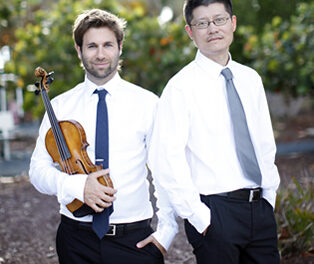North Carolina State University’s theatre group, University Theatre, is wrapping up Arabian Nights, adapted by famous playwright, Mary Zimmerman. The production is carried by a hearty cast of sixteen, with all of them playing multiple roles to tell the meta-theatrical tales. The play is adapted from The Book of the Thousand Nights and One Night and follows the story of a king who takes a new bride each day and kills her by the following morning. Finally there is one new bride who outsmarts him by telling him parables each night until dawn. Each night she must continue telling the stories to keep his interest in order to spare her life for one more day.
University Theatre’s production used imaginative ways to tell the story – from a camel formed from half a dozen young men to a ship with flowing waves formed from a small platform on wheels. Technically, the show was beautiful. The lighting design and the scenic design complemented each other and created a lavish Arabian palace that could also be transformed into the ten tales. Lighting designer Joshua Reaves and Scenic Designer Jayme Mellema created a rich atmosphere that was made complete by original live music composed by Naji Hilal. The direction, by Allison Bergman, allowed for all ten tales to remain their own stories, even though double and triple casting was common. The choreographed dances by Amara, who taught belly dance, and Souha Hilal, who taught dabki, brought the audience into the setting of Arabian Nights and demonstrated the dedication of the actors.
On the particular night I saw the performance, the company held the house for nearly fifteen minutes because they were waiting for a group of seven people on their way. University Theatre ended up beginning the show without them, but holding house for so long was a rocky way to start a show.
The actors, though many clear in vocal delivery, had actions that were not always clear and lacked character choices. It seemed as though the moments of high emotion, such as lust or rage, became face-offs between the opposing actors – a directing choice. The physical body and voice of the actors heightened but did not fulfill the actions. At times there were very odd sexual moments where the dances were not fluid or the actors simply looked uncomfortable being so close to one another. In other instances, the actors made me feel uncomfortable when subtlety was lost. With some fight choreography that seemed unrehearsed in the beginning and a scene of too much auditory stimulation near the end, this production felt like a big undertaking that pushed me away more than it drew me in. However, the show allowed many NC State students to participate in a production in a large way, which is the point of a university theatre group. They are building a group of actors whose craft will strengthen with the more productions they do. Recognition must be given to Matthew Hogan and Leanna Taylor Hall who both had developed characters and strong choices throughout the production.
The writing gives a final uplifting note as the king is taught how to trust and love again, and the audience is left feeling hopeful. Mary Zimmerman’s writing and directing style are wonderful to study, so if you get the chance to see her work performed, I would urge you to take the opportunity.
Arabian Nights ends 4/22. For details, see the sidebar and then rush to NCSU’s Titmus Theatre!
Editor’s Note: We bid farewell to Julie-Kate Cooper, who wraps up her Meredith degree next month and then heads for a theatre internship in Lexington, KY. We wish her great success in the months and years to come.











